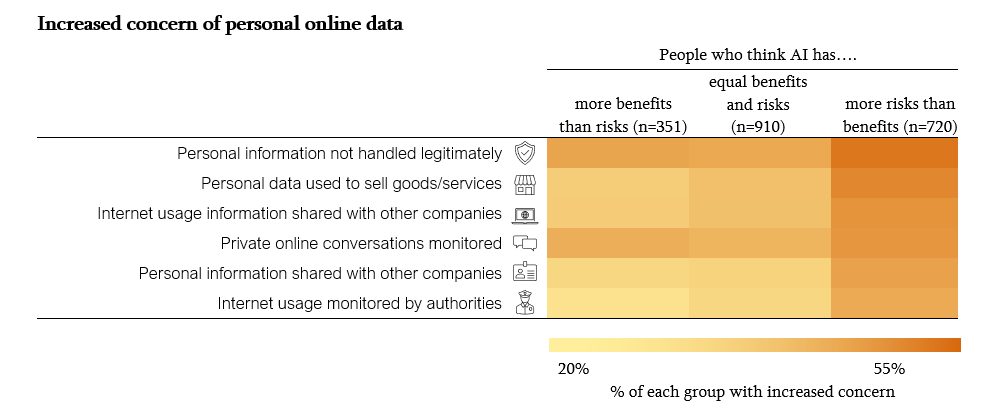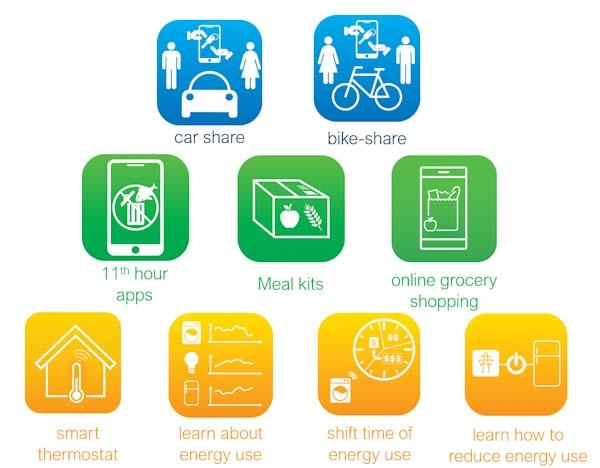Digitalisation vs data privacy – are you concerned about what the world of AI might be sharing about you – and is this having a knock-on effect for tackling climate change?
In this blog Emilie Vrain, Senior Researcher at the ECI, explains what her research has found.
Since Chat GPT was launched in November 2022, generative AI has taken centre stage of media attention, with particular focus on the risks and concerns of data privacy.
With our daily lives becoming increasingly digitalised, many digital activities, such as using smart home systems or car-sharing apps, have the potential to reduce carbon emissions but require sharing personal data.
The success of these technologies depends heavily on public trust. Our research investigated whether the hype around generative AI and the heightened awareness of associated risks have influenced people’s data privacy concerns and their usage of digital technologies that could help efforts to tackle climate change.

What did we do?
During early 2024, we conducted an online survey with 2,078 participants (nationally representative on age and gender) and collected insights on their knowledge and perceptions of AI, as well as changes in their data privacy concerns and usage of 16 digital technologies beneficial for climate change. Below, we provide a snapshot of initial results.
Is awareness of AI risks linked to concerns of data privacy?
Before any questions relating to AI, participants were asked about their current levels of concern for different types of personal online data, and then asked whether their concern had increased, stayed the same or decreased compared to a year ago (i.e., before the AI hype). Concern was reported to have increased the most amongst those who perceive AI has more risks than benefits. As you might expect!
Just over a third of participants believe there are more risks than benefits (compared to 18% who think there are more benefits than risks, and 46% think there are equal benefits and risks).
Overall, we found that the most important sources of information on AI were the general media as well as being aware of what others are doing, otherwise known as social norms. People who didn’t seek information nor had been exposed to multiple sources of information were more likely to report that there are more risks than benefits from AI.

Being concerned about data privacy is one thing, taking measures to try and protect yourself online is another. To see whether people had started taking more actions to protect their data privacy, we asked: ‘When, if ever, did you start taking any of the following measures?’.

The majority of survey participants reported that they started taking measures within the past year, with ‘strong passwords’ and ‘clearing browsing data and cache information’ being the most implemented.
Has increased data privacy concerns impacted people's usage of digital technologies beneficial for climate change?
Many activities, enabled by digital technologies and apps, exist which have the potential to help efforts to tackle climate change. We investigated 16 activities across daily life (retail, mobility, food, home).
We found that an increase in data privacy concern over the past year is not linked to a change in online retail activities but is linked to a change of the following mobility, food and home activities below:

Interestingly, users of these digital activities who reported an increase in data privacy concern were between 29% and 56% less likely to have decreased their usage.
We tested whether taking action to protect data privacy impacted these results, assuming that people with increased concerns take more steps to protect themselves and therefore didn’t decrease their usage. However, this was found not to be the case.
One interpretation would be that such digital activities are not thought to pose a risk to data privacy and are potentially perceived as more privacy-friendly or not intrusive by the users.
Looking across adopters of the 16 digital activities in our survey, between 31% and 59% decreased their usage last year alone. We continue to analyse our data on perceptions of AI to help understand changes that occurred last year.
Read more about our research on digitalisation including the iDODDLE project.


